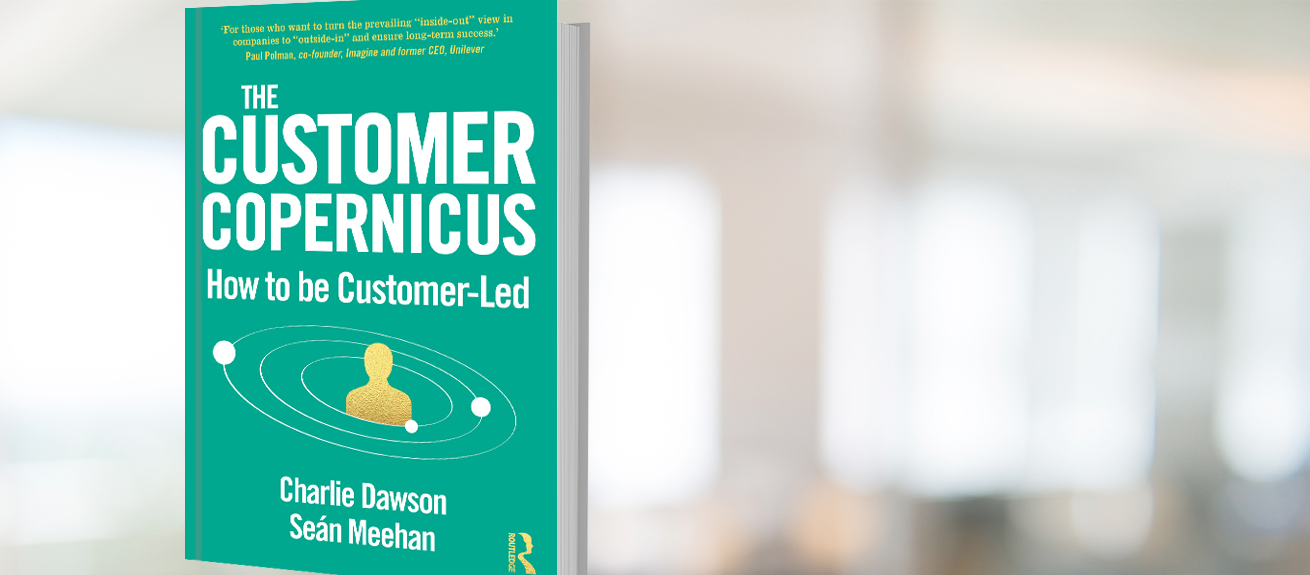
Customer-Led Success Stories
Beyond the Book: Introduction to the Series
Some companies are great for customers – not only do they care but they change whole markets to work better for the customers they serve. Think of Amazon, easyJet and Sky. They make things easier and improve what really matters – obvious, surely? They have also enjoyed huge business success, growing and making plenty of money.
The Customer Copernicus answers the question that follows – if it’s obvious and attractive why is it so rare? And then it answers a second question, because Tesco, O2 and Wells Fargo were like this once. Why, having mastered it, would you ever stop? Because all three did, and two ended up in court.
In The Customer Copernicus book we explain how to become and how to stay customer-led, making things better for customers by going first, into uncharted territory. We tell the stories of 18 different organisations who have each become what we call customer pioneers, a shorthand description of the kinds of customer-led successes at the heart of our work.
A story of customer-led success:
giffgaff
![imagejopue[1] - IMD Business School - IMD Business School](https://www.imd.org/wp-content/uploads/2022/08/imagejopue1-768x543.jpg)
giffgaff takes being customer-led, pioneering innovatively on behalf of customers, to the extreme. For twelve years and counting giffgaff has grown and led in its sector with its outside-in thinking, trusting the community which the business serves and being steered by them to an extraordinary degree. First conceived in April 2009, it launched as an innovative new venture by O2 (by then owned by Telefonica) in the UK with the aim of seeing whether a mobile network inspired by social media and digital collaboration could create value in new and better ways for a segment of the market.
CEO Ash Schofield sums the giffgaff ethos up with one word.“It’s about mutuality,”he says. We believe that giffgaff’s approach epitomises customer-led success. They have been prepared to lead, to believe that they will ultimately succeed if they make things better for their customers (or members as they call them) by listening, trusting and reflecting what matters most to them in the ways they operate.
The Glasgow Neonatal Unit
![imageqybwq[1] - IMD Business School - IMD Business School](https://www.imd.org/wp-content/uploads/2022/08/imageqybwq1-768x422.jpg)
This is a story about a policy change in the Neonatal Unit of The Royal Hospital for Children in Glasgow. That might sound like a technicality but it’s fundamental, a change in the shared beliefs that guided the way care was provided.
It has seen parents (the customers in this situation, at least the customer group old enough to speak) controversially taking the lead in the treatment and nursing of their premature and sick babies. Despite the perceived risks, this has had a profound positive effect on the lives of the babies, the families and the culture of nursing and care in the unit.
While some changes on the unit are the direct suggestions of parents, the new policy is not a matter of implementing a list of requests. It is a culture of listening to families and understanding what they really value and need from neonatal support, then taking the initiative in providing a radically different form of care by being innovative and by empowering colleagues.
Research Information & Knowledge Hub for additional information on IMD publications
- Customer-led success stories
- The Customer Copernicus: How to be customer-led
- Customer-led success stories
- The Customer Copernicus: How to be customer-led
Research Information & Knowledge Hub for additional information on IMD publications
Research Information & Knowledge Hub for additional information on IMD publications
In 2024, the management of Aluminium Cyclo Enterprises (ACE), was concerned that the European Union (EU) export rules for ferrous and non-ferrous scrap were becoming more restrictive. Not just the EU, but close to 43 countries had restricted the e...

Explore how innovation, R&D, and policy reforms are reshaping China’s pharmaceutical sector amid rising healthcare demand and demographic shifts.
This study investigates whether male and female entrepreneurs exhibit systematic differences in the customer learning actions they pursue, and how those actions convert to venture performance. Drawing from a dyadic sample of founders and startup a...

Taking up a new leadership post can mean a dramatic shift in the way others see you – and how you define yourself. It is vital to learn how to separate your true self from the demands and expectations of the role.

Campaign failures at Apple, Bud Light, & Jaguar show why boards must prioritize marketing oversight. Insights from Su-mei Thompson.
In late 2022, Tim Kuniskis, CEO of the Dodge brand (part of the Netherlands-based Stellantis automobile corporation), announced that 2023 would be the last production year for its popular “muscle car” models, the Dodge Charger and Challenger. Thes...
BARCELONA, JANUARY 2023. What started in 2016 as a humble entrepreneurial attempt to contribute to a more sustainable future had turned into a solid eyewear brand present in major Western markets. François van den Abeele was even more excited by t...
Founded by Lim Hock Chee in 1985, Sheng Siong has evolved from a humble grocery store into a leading supermarket chain in Singapore, renowned for its cost-effective pricing and commitment to customer satisfaction. Mr Lim’s unique philosophy, which...
As with most business opportunities, branding is essential to pioneering in sustainability. Only with branding can a company resist commoditization and obtain a premium price to compensate for the upfront investment and risk in making a major chan...
The Swiss start-up Planted makes plant-based meat substitutes with remarkable environmental benefits. Its “beef” requires 97% less CO2 and 81% less water than meat from cows, while its “chicken,” also from pea protein, involves 77% less CO2 and 81...
Case reference: IMD-2665 ©2025
Research Information & Knowledge Hub for additional information on IMD publications
Research Information & Knowledge Hub for additional information on IMD publications
in Entrepreneurship Theory and Practice 14 February 2025, ePub before print, https://doi.org/10.1177/10422587241311119
Research Information & Knowledge Hub for additional information on IMD publications
Research Information & Knowledge Hub for additional information on IMD publications
in I by IMD
Research Information & Knowledge Hub for additional information on IMD publications
Research Information & Knowledge Hub for additional information on IMD publications
Research Information & Knowledge Hub for additional information on IMD publications
Research Information & Knowledge Hub for additional information on IMD publications
in Binder, Julia Katharina (Ed.); Haanaes, Knut Bjarne (Ed.) / Leading the sustainable business transformation: A playbook from IMD, pp. 127-136 / Hoboken: Wiley, 2025
Research Information & Knowledge Hub for additional information on IMD publications
in Binder, Julia Katharina (Ed.); Haanaes, Knut Bjarne (Ed.) / Leading the sustainable business transformation: A playbook from IMD, pp. 151-165 / Hoboken: Wiley, 2025
Research Information & Knowledge Hub for additional information on IMD publications





